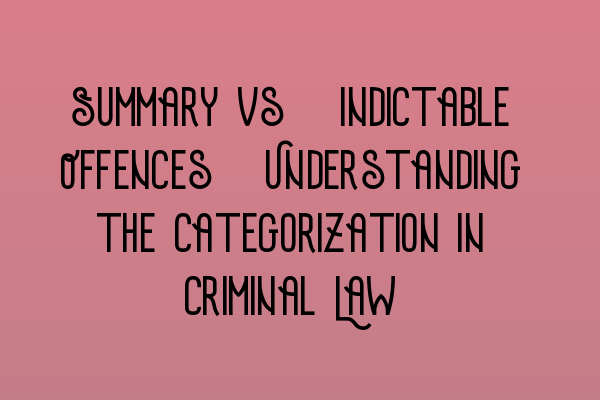Summary vs. Indictable Offences: Understanding the Categorization in Criminal Law
When it comes to criminal law in the UK, offences are broadly categorized as either summary offences or indictable offences. This categorization plays a crucial role in determining the route through which a case will proceed, impacting the procedures, the severity of the potential penalties, and the courts that have jurisdiction over the matter.
Summary Offences
Summary offences, also known as minor offences, are less serious crimes that are typically dealt with by a Magistrates’ Court without a jury present. These offences generally carry lower penalties compared to their indictable counterparts. Examples of summary offences include petty theft, minor assaults, and some driving-related offences.
For many individuals facing summary offences, the importance of legal representation cannot be overstated. Seeking advice from an experienced criminal solicitor can help navigate the complexities of the legal process and potentially mitigate the penalties involved.
Indictable Offences
Indictable offences, on the other hand, are more serious crimes that are typically heard by the Crown Court, a higher court with the power to impose heavier penalties. These offences often involve more complex legal issues and may require a trial by jury.
Indictable offences cover a wide range of criminal activities, including serious assaults, drug trafficking, fraud, and murder. These offences are usually more grave in nature and carry stiffer penalties. It is crucial for those facing indictable offences to secure the services of a skilled criminal barrister who can build a robust defense and ensure their rights are protected.
The Hybrid Offence Category
In addition to summary and indictable offences, there is a third category known as hybrid offences, also referred to as “either-way” offences. These offences can be treated as either summary or indictable, depending on their seriousness or other circumstances. The decision on where to try the case is typically made by the prosecution.
Examples of hybrid offences include theft, certain types of assault, and drug possession for personal use. The Crown Court handles more serious instances of these offences, while Magistrates’ Courts deal with less severe cases.
Choosing the Right Legal Representation
Given the potential consequences associated with summary and indictable offences, it is crucial to choose the right legal representation to ensure the best possible outcomes.
At SQE Criminal Law & Practice Law UK, we understand the intricacies of criminal law and the importance of tailored defense strategies. Our team of experienced solicitors and barristers is dedicated to providing top-notch legal representation for individuals facing a range of criminal charges.
Whether you need assistance with a summary offence or an indictable offence, our experts are here to guide you through the legal process and fight for your rights. We offer comprehensive preparation courses for the Solicitors Qualifying Examination (SQE) to equip aspiring solicitors with the knowledge and skills necessary to excel in their careers.
For individuals preparing for the SQE exams, we also provide practice exam questions and mock exams to help you assess your knowledge and identify areas for improvement. Additionally, our website provides information on SQE exam dates to keep you updated on the latest exam schedules.
Don’t let the complexities of criminal law overwhelm you. Contact SQE Criminal Law & Practice Law UK today to consult with our expert solicitors and barristers. We are here to provide you with the support and guidance you need to navigate the criminal justice system and achieve the best possible outcome for your case.
Related Articles:
